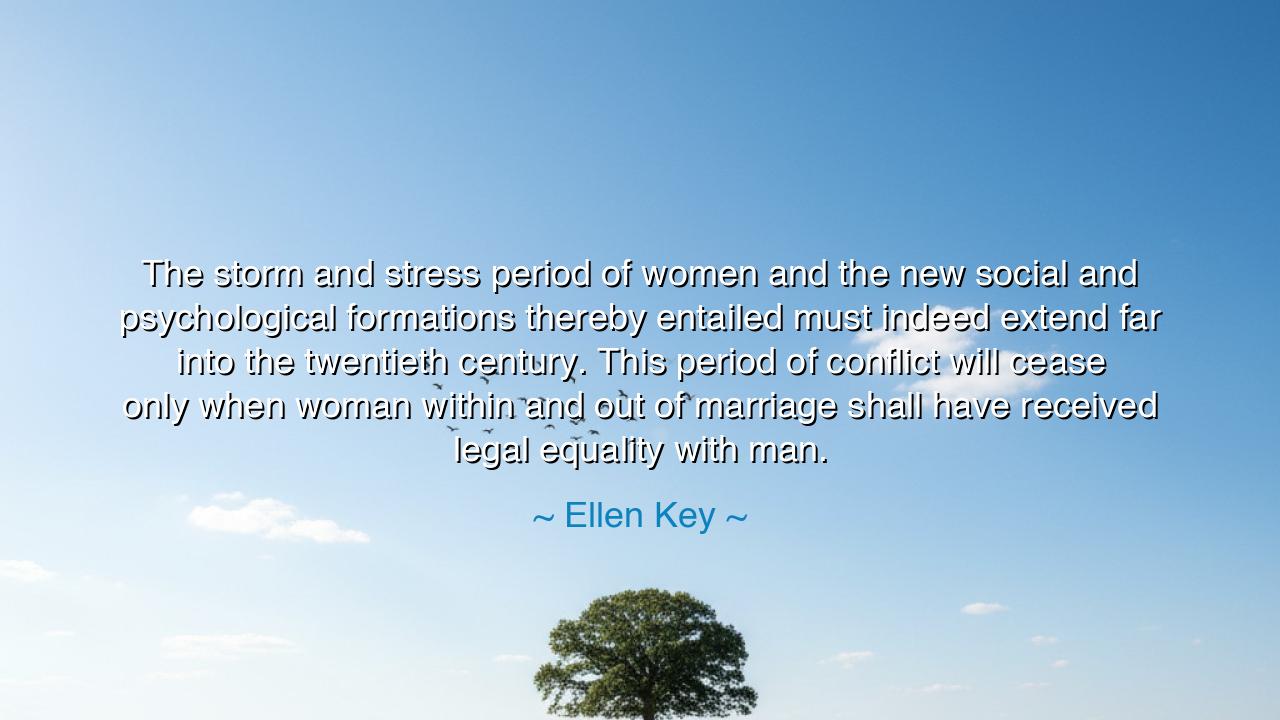
The storm and stress period of women and the new social and
The storm and stress period of women and the new social and psychological formations thereby entailed must indeed extend far into the twentieth century. This period of conflict will cease only when woman within and out of marriage shall have received legal equality with man.






In the annals of human thought, few voices have spoken so eloquently of justice, equity, and the moral progress of society as Ellen Key. Her words, “The storm and stress period of women and the new social and psychological formations thereby entailed must indeed extend far into the twentieth century. This period of conflict will cease only when woman within and out of marriage shall have received legal equality with man,” illuminate a profound truth: the struggle for equality is both social and legal, external and internal, personal and collective. Here lies a meditation on justice, transformation, and the enduring human quest for fairness, a reflection that resonates across centuries and cultures.
From the courts of ancient Athens to the halls of medieval Europe, women have often been constrained by law, custom, and expectation. They were denied property rights, legal standing, and political voice, confined to domestic spheres and subjected to the authority of men. Key’s observation frames this historical reality as a “storm and stress” period—a time of conflict not only with societal structures but within the psyche of women themselves, as they navigated roles imposed upon them while yearning for autonomy. The path to equality, she suggests, is inseparable from both legal recognition and psychological liberation.
History offers vivid examples. In the late 19th and early 20th centuries, pioneers such as Emmeline Pankhurst in Britain or Susan B. Anthony in the United States challenged entrenched laws and social norms. Their activism—marching, writing, lobbying—was met with resistance, ridicule, and sometimes imprisonment. Yet their efforts brought attention to the inequities that Key described, demonstrating that the struggle for women’s equality is a prolonged, often tumultuous journey, requiring persistence in both public and private spheres.
Key emphasizes the legal dimension of equality as a prerequisite for the cessation of conflict. Property rights, the right to vote, and equality within marriage are not mere formalities; they are mechanisms by which society acknowledges the full humanity of women. Without these protections, the storm of tension, frustration, and injustice continues unabated. Legal recognition serves as the foundation upon which social transformation rests, transforming aspiration into tangible freedom.
Consider the historical transformation in marriage laws in Sweden, where Key herself lived and wrote. In the early 20th century, married women had limited control over property and finances. Through persistent advocacy, reforms gradually granted married women equal rights in property, custody, and labor. The “storm and stress” she described began to abate as laws recognized women as equals within and outside marriage. Key’s vision illustrates that legal equality is both a milestone and a catalyst for broader social and psychological change.
The philosophical resonance of her words is timeless. True equality is holistic; it encompasses the legal, the social, and the personal. Key reminds us that systemic change requires both codified rights and the transformation of societal attitudes. Without legal equality, social liberation is incomplete, and the internalized conflicts borne by women persist. This principle extends beyond gender alone, reflecting the broader human struggle for fairness, recognition, and dignity.
For contemporary readers, the lesson is clear: advocate for legal structures that protect equality, challenge social norms that perpetuate injustice, and cultivate personal awareness of internalized biases. Transformation is not a singular event but a sustained effort across generations, requiring courage, reflection, and unwavering commitment to justice. By addressing both law and culture, society can move closer to the harmony Key envisioned.
Thus, Ellen Key’s words endure as a beacon through history: the storm and stress of inequality will persist until justice is codified and recognized in both public and private life. Let her reflection guide each generation to honor the principles of fairness, to challenge entrenched inequities, and to create a world where the dignity and rights of all, within and beyond marriage, are respected. In this pursuit lies the enduring promise of a just and enlightened society.






AAdministratorAdministrator
Welcome, honored guests. Please leave a comment, we will respond soon